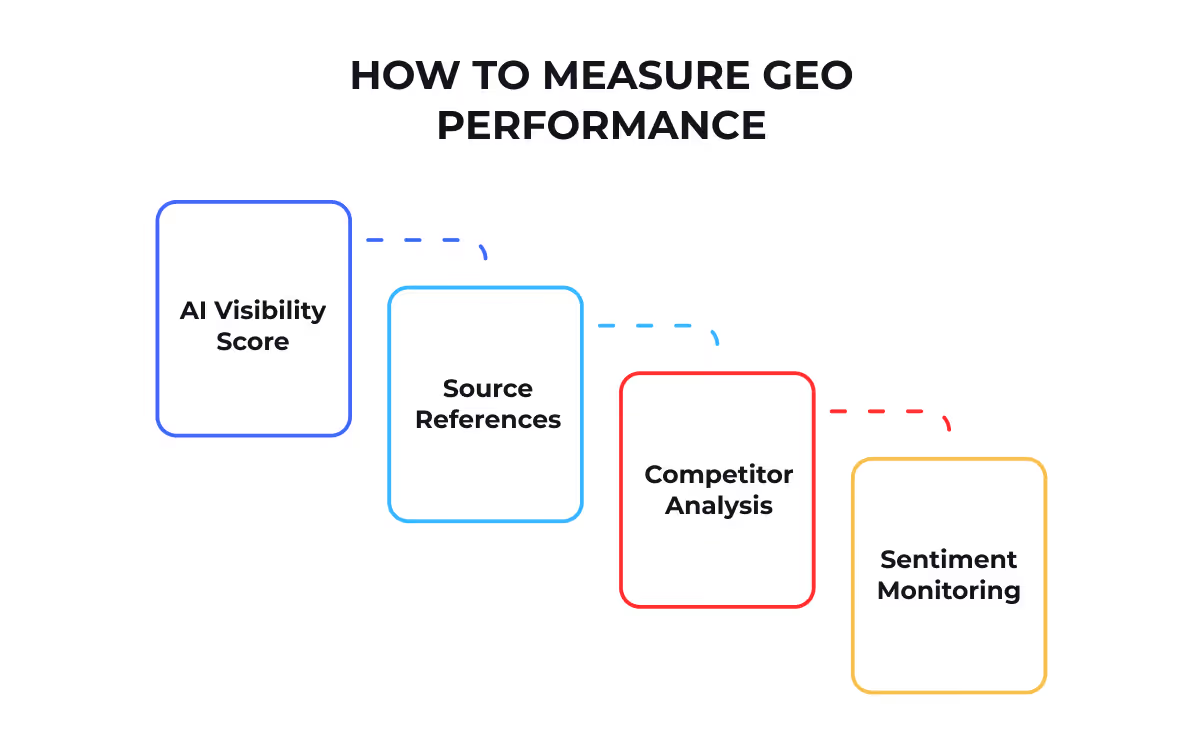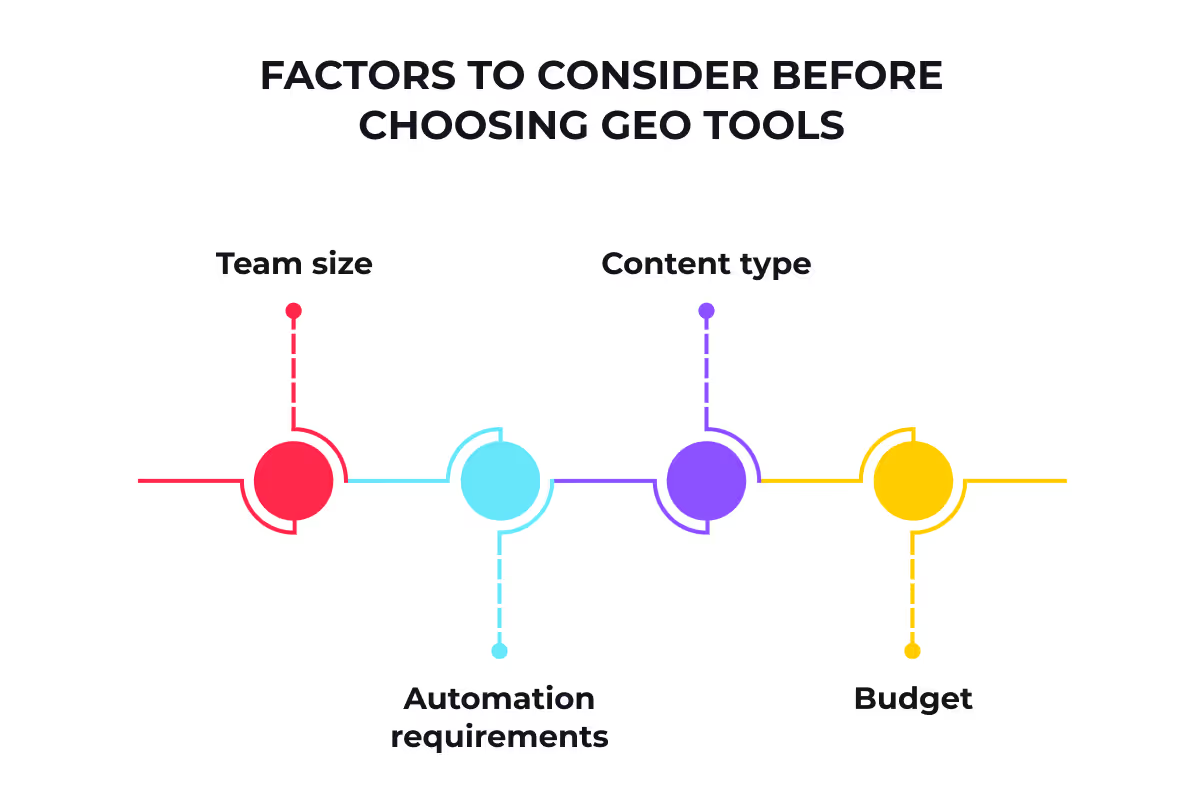
Discover the top 9 GEO tools for optimizing AI platform content like ChatGPT and Google SGE. Features, prices, and recommendations inside.
Generative AI is transforming the digital landscape, and with its rapid adoption comes new challenges and opportunities for businesses and content creators. According to Gartner’s 2024 AI Search Report, search interactions will shift to generative engines by 2026, causing 25% drop in traditional search (Gartner, 2025).
If you want to stay visible in this AI-driven search revolution, the right generative engine tools are essential. GEO tools are designed to help content creators ensure their work not only ranks well on traditional search engines but also gets cited and summarized in AI platforms like ChatGPT, Perplexity.ai, and Google SGE.
Here’s a list of the 9 best generative search optimization tools for 2025 that will help you structure and optimize your content to thrive in the AI-first era.
GEO is all about optimizing your content to stand out in responses from AI search engines. It’s a powerful way to ensure your message reaches the right audience at the right time.
GEO focuses on:
Goodie AI's recent study, the AEO Periodic Table, provides valuable insights into the factors influencing AI search visibility and rankings. (Goodie, 2025)
As Mostafa Elbermawy, Goodie expert states, "Across all models, content quality and depth emerged as the most critical factor in determining visibility."
Generative Search Optimization (GEO) tools are platforms designed to optimize your content for integration into generative AI search engines. Unlike traditional SEO tools that focus on ranking in search engine results pages (SERPs), GEO tools prioritize features that optimize content for clarity, citation inclusion, and semantic structure.
Imagine creating content that AI platforms can easily extract, summarize, and present to users in a natural, trustworthy manner. These tools focus on the following functionalities:

Here are key GEO metrics to monitor:
Monitoring these metrics offers valuable insights into the success of your GEO strategy and highlights opportunities for optimization.
Key Features
Why It Stands Out: Built for scalability, Content Harmony integrates seamlessly with enterprise content management systems (CMS), making it ideal for large content teams that need in-depth optimization and control.
Pricing: Starts at $399/month.
“Content Harmony is such a valuable life hack for our agency! If you’re helping clients with SEO-driven content marketing, it lets you get things done a whole lot faster and better.”
-Jason Berkowitz, Founder and SEO Director, Break The Web
Key Features
Why It Stands Out: Perfect for teams transitioning from SEO to GEO by balancing both functions in one dashboard.
Pricing: From $89/month.
Key Features
Why It Stands Out: Optimizes content to establish trust and authority, a key factor for AI engines like ChatGPT to prioritize mentions.
Target Users: HealthTech, FinTech, and legal content teams.
Key Features
Why It Stands Out: Combines content drafting with live AI snippet monitoring, ensuring your content always aligns with what leading AI engines prefer.
Pricing: Starts at $39/month.
Key Features
Why It Stands Out: Ideal for creating in-depth, evergreen content that generative AI engines like Google SGE love to reference.
Key Features
Why It Stands Out: Perfect for managing end-to-end workflows in multi-person teams, combining efficiency with quality.
Key Features
Why It Stands Out: Simplifies the task of aligning content with the Q&A formats that are heavily used by AI platforms.
Pricing: From $59/month.
Key Features
Why It Stands Out: Guarantees alignment with your brand voice, making it a favorite among enterprise-level teams focused on brand integrity.
Pricing: Enterprise-only.
Key Features
Why It Stands Out: Ideal for long-term monitoring and verification of AI mentions, helping you refine your strategy over time.
If you’re wondering how GEO tools directly impact your content’s visibility in generative AI platforms, here’s what they enable you to do:
According to the 2025 Generative Content Index, “Content optimized with GEO tools sees 31% more mentions in AI-generated responses.”

Not all tools suit every use case. Consider the following before selecting one:
How are generative engine optimization (GEO) tools different from traditional SEO tools?
Traditional SEO tools are built around tasks like keyword research, backlink tracking, and optimizing on-page elements. Generative optimization tools, however, take it a step further by using AI to focus on context, search intent, and semantic relevance. Instead of just targeting specific keywords, these tools help your content perform better in AI-driven searches by understanding the deeper meaning behind queries.
Do you need advanced Search Engine OPtimization (SEO) knowledge to use generative tools?
Not at all. While SEO knowledge is a plus, most generative optimization tools are built with simplicity in mind. They provide clear, actionable insights that are easy to follow, even for beginners. Whether you’re a marketer, business owner, or content creator, these tools make it easier to optimize your content without requiring deep technical expertise.
What should you consider when selecting a generative optimization tool?
When choosing a generative optimization tool, look for features like AI-driven content analysis, intent-based recommendations, semantic keyword suggestions, and competitor insights. The ideal tool should offer practical, easy-to-apply suggestions that help you create content optimized for modern search engines powered by AI.
Generative AI search engines are reshaping the digital marketing strategy landscape. With the initial excitement surrounding AI turning into tangible innovation, businesses must evolve how they approach search behavior, user queries, and content creation processes.
Unlike traditional search engines that rely on keyword matching and backlinks, generative search engines use natural language processing (NLP) and AI algorithms to deliver accurate and comprehensive responses. These AI-driven platforms analyze user intent more deeply and present content in structured data formats, enhancing online visibility and user engagement.
To succeed, brands must move beyond traditional SEO tactics. GEO tools are built to enhance performance on AI-driven search platforms such as ChatGPT, Google AI Overviews, and Perplexity. By integrating visual and interactive elements, formatting content for structured data, and applying best practices such as schema markup, businesses can significantly boost source visibility.
More importantly, GEO optimization aligns with E-E-A-T principles—creating authoritative content that reflects expertise and trustworthiness. These tools also help monitor organic Google search metrics, such as AI citations, and adapt your strategy based on search volume and competitive insights.
Whether you're a leading digital marketing agency or an in-house team adapting to ai-driven search engines, these tools support critical tasks like keyword research, writing for natural language, and formatting to match user search behavior.
From optimizing meta tags and content for user queries to using an AI search grader that evaluates your visibility, GEO tools transform the traditional search engine formats into AI-compatible frameworks.
The bottom line? Brands that leverage AI tools to align content with how users search today will outperform competitors relying solely on traditional SEO strategies.